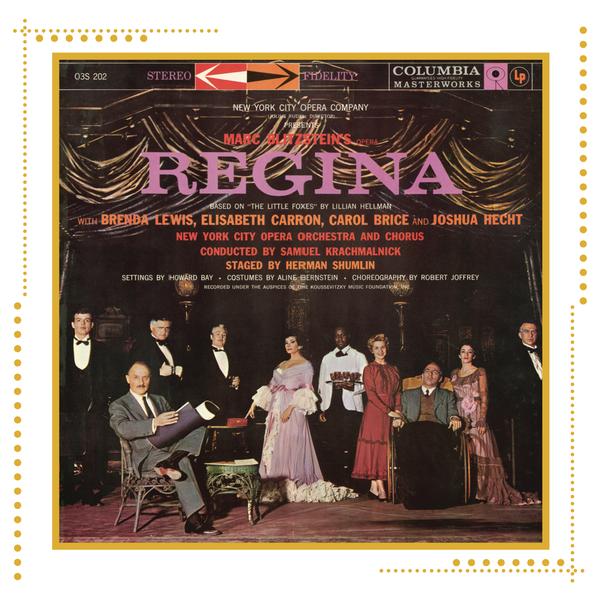The first time I ever listened to Marc Blitzstein‘s Regina, I admit I wasn’t very impressed. As it turns out, it was because of the recording I was listening to. The 1992 Scottish Opera recording was the only digital version of the score available. While it is a note-complete reconstruction of the score as Blitzstein wanted it, the whole affair is just dull. The tempos lag, the singers muddle the words and much of the score’s impact is lost as a result. Was I surprised when I received the 1958 NYCO cast recording this past summer. As soon as I started playing the album, it felt like I was hearing the score for the very first time. Everything about the score struck me, from Brenda Lewis’ terrifying portrait of the title character to Elizabeth Carron’s heartbreaking Birdie. The melodies resonated more than they did previously while Blitzstein’s libretto sunk in with a clarity I hadn’t expected.
Over the last few months, I’ve found myself growing more and more attached to the score. An operatic adaptation of Lillian Hellman‘s famed The Little Foxes, I can’t say that setting the avaricious Hubbard clan to music was altogether necessary, but I doubt that anyone could have come up with a more thrilling, layered and musically fascinating work. Regina is a demanding score, but its rewards are many as a fascinating musical drama combining operatic conventions and Southern musical idioms. The contrasting use of the spiritual and ragtime, the period music of the second party sequence all speak to the play’s Deep South setting and of the decline of Southern aristocracy at the turn of the 20th century.
The opera follows the plotting of the play very closely, but expands on certain scenes and adds unseen characters, especially in a second act party (which also allows a wonderfully caustic choral number in which the party guests relay their true feelings about the Hubbard family). This second act ends with one of the most ferocious buttons I’ve ever heard. Regina has basically been told by her ailing husband that he’s going to thwart her attempts sings at her ailing husband during a spirited gallop, “I hope you die/Soon!/I’ll be waiting for you to die.” As the music comes to its finish, the orchestra hits a climactic chord followed by Regina’s pronounced and menacing “I’ll be waiting” (the syllable ‘wait’ is on top C with fermata) and that a cappella flourish brings the act to a chilling close.
The third act switches gears as all the good characters – Horace, Addie, Birdie and Zan – sit on the veranda in the morning where they sing the stunning “Rain Quartet,” which provides a quieter contrast to the ferocity of the previous scene. Zan cheerily implores the foursome to “make a quiet day,” but the problems within the family keep surfacing throughout the number. The leitmotif for “Consider the rain” and the off-stage hymn will be heard again during the finale with an absolutely breathtaking impact. The quartet segues directly into one of the most compelling moments in which the kindly Birdie, who has been the barely tolerated whipping post for most of the family, reveals the truth about herself and her feelings towards her immediate family to young Zan. In the original play it’s a showstopper (Patricia Collinge, Margaret Leighton, Maureen Stapleton and Frances Conroy on Broadway), a scene-stealer in the 1941 film (an Oscar nomination for Collinge) and a stunner called simply “Birdie’s Aria” in the opera (originally Brenda Lewis, who later sang the title role of Regina for the NYCO and subsequent cast album). It’s one hell of a scene.
This is the first major aria sung by Regina in the first act after the family’s first quibble over the business deal. She’s fed up with the bickering and admonishes her brothers with a pointed “Why don’t you all go home?” when she launches into “The Best Thing of All.” Here is Brenda Lewis, who is frankly far superior to her original Broadway counterpart Jane Pickens:
%CODE1%
And here’s a concert rendition of the Rain Quartet from the 1992 Richard Tucker gala. The conductor is James Conlon. Samuel Ramey is singing the role of Horace, Denise Woods is Addie, Maureen O’Flynn is Zan and the one and only Renee Fleming is Birdie. (If only this was followed by “Birdie’s Aria”…)
%CODE2%

